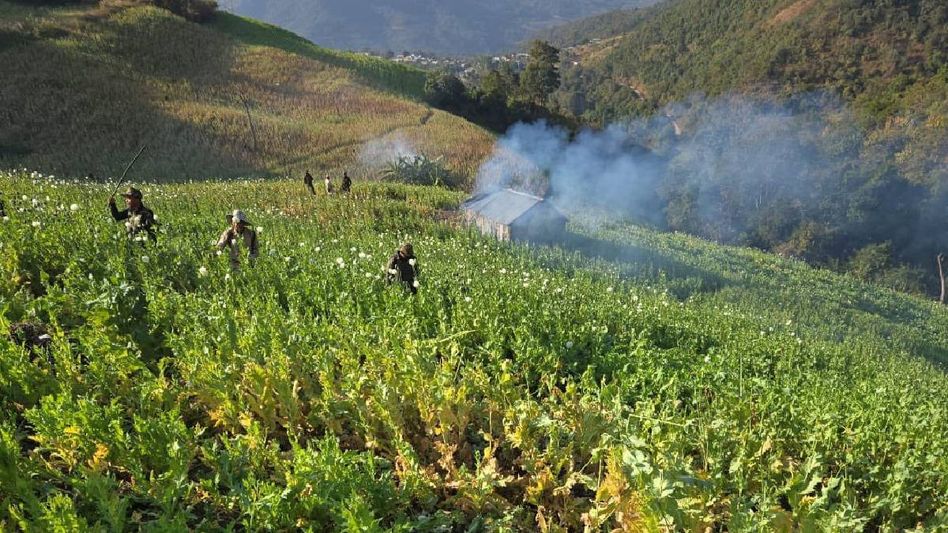In a significant move against illegal drug production, security forces in Manipur have destroyed 48 acres of poppy plantations in Churachandpur district. The operation was carried out as part of the state government’s ongoing “War on Drugs” initiative, aimed at combating drug trafficking and curbing illicit cultivation.
The eradication drive, conducted on January 15, involved joint efforts by the Manipur Police, Assam Rifles, forest officials, and local authorities. Equipped with actionable intelligence, the team focused on regions within the T. Lhanghoimol area, where extensive poppy plantations had been identified.
The security forces employed advanced tools and techniques to clear the fields, ensuring the operation adhered to legal protocols under the supervision of an executive magistrate.
The recent operation underscores the state government’s broader strategy to eliminate illegal poppy cultivation. Since the launch of the “War on Drugs” campaign in 2018 under Chief Minister N. Biren Singh, authorities have reportedly destroyed over 19,000 acres of poppy fields across Manipur’s hill districts.
Data reveals that Kangpokpi district witnessed the largest scale of eradication, with 4,454 acres of plantations destroyed. Other affected regions include Ukhrul (3,348 acres) and Churachandpur (2,714 acres), reflecting the widespread nature of the issue.
Despite significant progress, challenges persist in addressing the root causes of poppy cultivation. Many farmers in remote areas resort to cultivating poppies due to limited economic opportunities and the crop’s high market value in the illegal drug trade.
Authorities have also encountered resistance from certain local communities, while the region’s challenging terrain often hampers large-scale operations. Additionally, reports indicate that some farmers have returned to planting poppies even after previous eradication efforts.
To enhance the effectiveness of the campaign, the Manipur government has employed advanced technologies such as Geographic Information Systems (GIS) and remote sensing to identify areas of illegal cultivation. These tools enable authorities to locate plantations in inaccessible terrains, allowing for precise and targeted operations.
The issue of poppy cultivation is not unique to Manipur, as several states in India grapple with similar challenges. However, Manipur’s proximity to the “Golden Triangle”—a region bordering Myanmar, Laos, and Thailand known for drug production—has exacerbated the problem.
The poppy fields serve as a source for the production of heroin and opium, which are trafficked through both domestic and international channels. The financial implications of this trade pose significant risks to the socio-economic fabric of the region.
The destruction of 48 acres of poppy plantations in Churachandpur district marks another milestone in Manipur’s ongoing battle against illegal drug production. While the “War on Drugs” campaign has achieved measurable success, the need for sustainable alternatives for affected farmers and continued vigilance remains critical.
The government’s concerted efforts, combined with technological advancements and inter-agency coordination, reflect a determined approach to addressing a deeply entrenched issue. However, the long-term success of such initiatives will depend on addressing the economic and social factors driving illicit cultivation.



